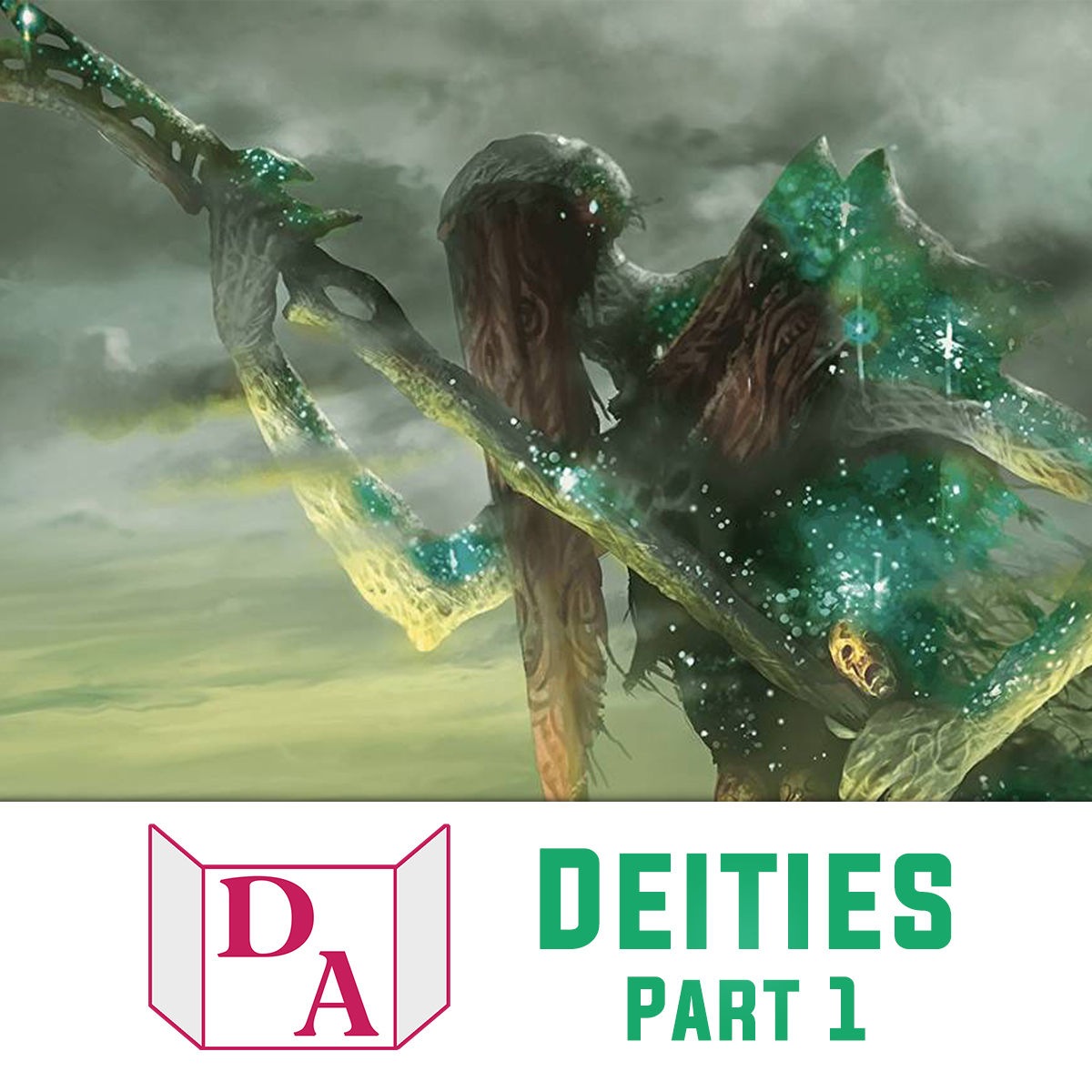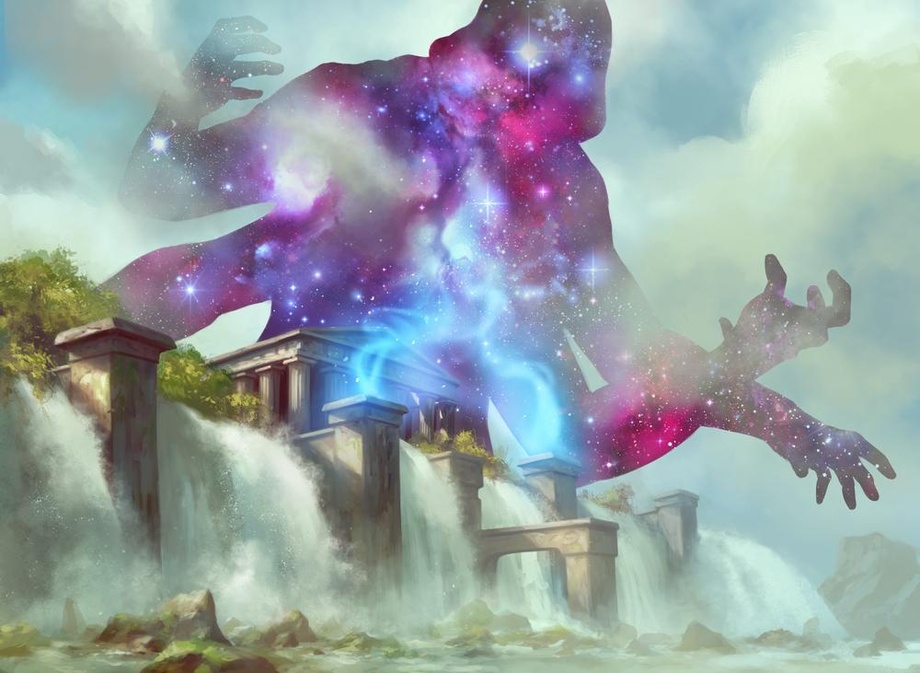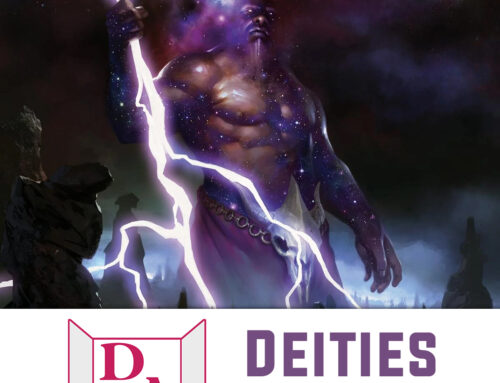Deus Ex Tali – God in the Dice
Most every setting in D&D has gods in one form or another, and are usually fundamental to the beginnings of a setting. They are the forger of worlds, and progenitors of races. Wars are fought in their name, and civilizations form around their worship. Despite all this, they are often aloof, and don’t directly interfere with the daily affairs of mortals. In this article and a few more to come, I’ll be covering a number of things to consider when making and utilizing a pantheon.
Where Did it Begin?
Worlds and creation have to begin somewhere, and the divine powers more often than not have a hand in it. In the Forgotten Realms setting, the Lord Ao made everything. The universe was a void out of time until Ao brought into being Shar and Selune. From their efforts, the Astral Sea and heavenly bodies that fill it. When they brought Abeir Toril into being, Chaantea (Gaea). Chaantea wanted to populate the world with light, but the only light was the cold light of Selune. Shar and Selune fought over whether the cosmos should be one of still darkness or warm life. This conflict brought the gods of war, death, and destruction. In defiance Selune reached into the plane of fire, and set a large planet a flame and set it to be Abeir Toril’s sun. Shar tried to smother this sun, but to protect this beacon of warmth, Selune hurled her own divine essence at her sister. This mighty blow struck Shar’s own magic, and Mystra the goddess of magic was born. With the coming of Mystra, also came the Weave, the hidden intricate web through which all magic flows.
There is much more to this myth of creation, but you can already see where it is going. Many creation myths have these recurring themes of emptiness that are suddenly filled by great overbeings that seem to coalesce from nowhere, or perhaps they have been there for eternity, and this is just their newest iteration of a cosmos. From there, the dominos continue to fall, creating more and more gods, each one slightly more diminished than the last generation until you finally reach a world inhabited by mortals. The Forgotten Realms mirrors greek mythology. That gods are born from great events, and are sometimes siblings rather than great monolithic entities.
Behind the Curtain
The myths of the gods are not always the supreme truths the mortals of that setting claim them to be. That the mysteries of the gods can not so easily be laid out in pretty stories. In the Forgotten Realms almost no one knows of Lord Ao and his overseeing of the cosmos. No one knows that it was he who started it all by bringing Shar and Selune into being. None know that it was he that saved Abeir Toril by splitting it into two worlds, and creating the Tablets of Fate that would bind the gods to maintain balance. All of these things are secret to mortals, and are known to very few.
When making your mythos what parallel stories make your world? Did the gods really create everything or did they conquer the old gods and take their creations for their own? Is the shadow god truly the adversary of good or were they the loser of a great conflict long ago and their followers branded as heretics? Divergences like these create a more multifaceted world. The ancestral tales of the dwarves may tell a different beginning to everything than the orcs. Is one right? Is either one right? How does this shape their cultures? How do different cultures see a god?
Locking God in a Box
A question I will often ask myself about a pantheon is why aren’t they there to stop the great problems that threaten a world? Why do they act through intermediaries such as clerics, paladins, and adventuring parties? Is it because they are not as omnipotent as priests and clerics would preach? Maybe there are old cosmic laws that prevent deities from directly interfering with the lives of mortals. Were these limitations self imposed like the gods of Exandria, where the Prime Deities bound themselves and the Betrayer Gods behind the Divine Gate, a barrier that prevents gods from returning to the Material Plane, their influence limited to bestowing magic to their followers, sending outsiders (like celestials and fiends) as emissaries, and very rarely manifesting avatars, being that contain a tiny fragment of the gods true power.
We’ve seen this in other literature, specifically the Lord of the Rings where the gods once fought a great war across the world. When it was over they were so horrified and distraught by the damage done to their beautiful world that they swore they would never return to Middle Earth, even when it was threatened to be consumed by Sauron. In the Forgotten Realms there isn’t a clear answer, but I always believed that if a god began to abuse their power the other deities would intervene against them. So the gods have to work through much more subtle means, like a secret cult, or a party of adventures.
Next Time
Gods can be a great place to establish the overarching tones and themes of a setting. Which gods are worshipped, and which gods are feared can tell you a lot about what a people or culture hold in high esteem. Next time I’ll go over fleshing out your pantheon with a myriad of gods and what they might be like.




